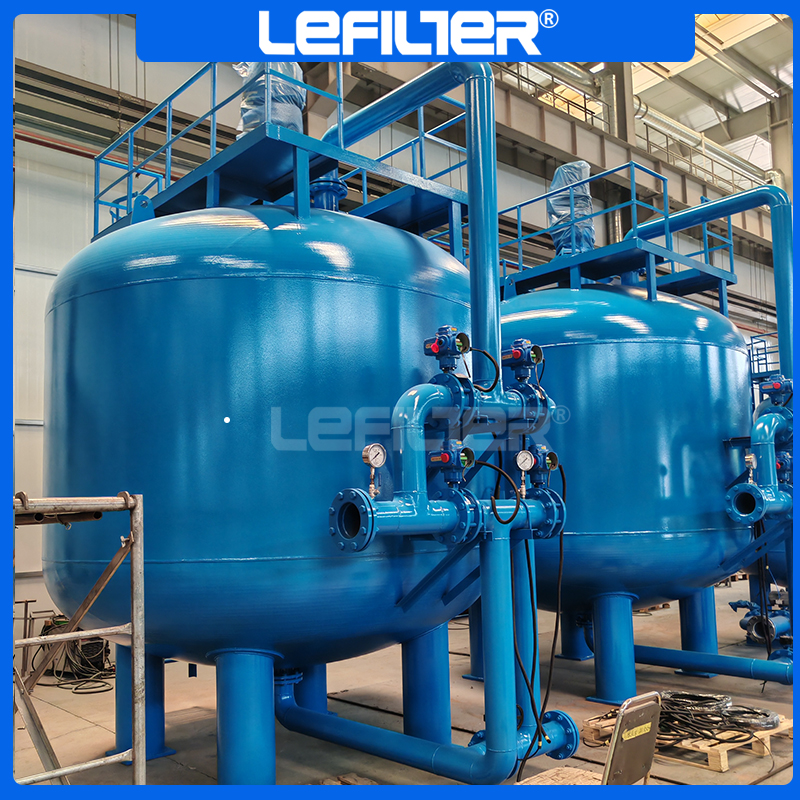-

Preventing Fouling in Cooling Water Systems
Cooling water systems are essential components of many industrial facilities, from power plants to petrochemical complexes. They help dissipate heat generated during various processes, ensuring that equipment operates efficiently. However, the challenge of fouling poses a significant threat to the functionality of these systems. Understanding the impact of untreated cooling water on key equipment and the measures necessary to prevent fouling is crucial for maintaining long-term operational efficiency.Read more -

The Role of Water Filtration in Steam Turbine Efficiency
Steam turbines are critical components in power generation, converting thermal energy from steam into mechanical energy. However, the efficiency and longevity of these turbines can be significantly compromised if impurities in the feed water are not adequately managed. Understanding the impact of water impurities and the role of effective filtration is crucial to maintaining optimal turbine performance.Read more -

The Future of Filtration Technology in the Oil and Gas Industry
As the oil and gas industry faces increasing demands for efficiency and environmental responsibility, filtration technology has taken a pivotal role in enabling cleaner, more effective operations. Recent advancements, especially in automated and smart filtration systems, signal a transformative future for the industry, optimizing everything from fluid quality to overall operational performance.Read more -

Economic Impact of Filtration on Oil and Gas Industry Operations
The oil and gas industry operates in a highly competitive environment where efficiency and cost-effectiveness are paramount. Filtration systems, including self-cleaning and multimedia filters, play a critical role in optimizing operations, reducing costs, and ensuring the sustainability of resources. We explore the economic impact of filtration technologies on oil and gas operations, focusing on how they contribute to cost savings, improved efficiency, and reduced environmental liabilities.Read more -

Environmental Benefits of Advanced Filtration in Oil and Gas
The oil and gas industry has long been scrutinized for its environmental impact, with significant concerns regarding water usage, waste generation, and pollution. However, advancements in filtration technologies—specifically self-cleaning and multimedia filters—are playing a crucial role in mitigating these environmental concerns. We explore how these advanced filtration systems reduce the industry's environmental footprint, aid in water recycling, and contribute to sustainable practices in oil and gas production.Read more -

Multimedia Filters in Wastewater Treatment for Refineries: Ensuring Compliance and Environmental Protection
In the oil and gas industry, wastewater treatment is a critical aspect of refinery operations. Refineries generate substantial amounts of wastewater, which can contain harmful contaminants such as hydrocarbons, heavy metals, and other pollutants. The management and treatment of this wastewater are essential to comply with environmental regulations and to protect surrounding ecosystems. Multimedia filters play a significant role in refining wastewater treatment, ensuring that effluents meet regulatory standards before discharge. We explore the importance of multimedia filters in wastewater treatment for refineries, their operational mechanisms, and the environmental benefits they provide.Read more -

Self-Cleaning Filters in Downstream Refining Processes: Ensuring Purity and Efficiency
In the downstream sector of the oil and gas industry, refining processes transform raw crude oil into consumable products like gasoline, diesel, and other valuable petrochemical derivatives. Throughout these complex stages, contaminants can compromise the quality of the final product and the performance of refinery equipment. Self-cleaning filters, therefore, play a crucial role in downstream refineries by ensuring that impurities are continuously removed, maintaining high standards of product quality and efficiency. We explore the role of self-cleaning filters in downstream refining, the benefits they offer, and how they contribute to consistent, cost-effective operations.Read more -

Multimedia Filters in Midstream Natural Gas Processing: Ensuring Purity for Efficient Distribution
The midstream sector of the natural gas industry plays a crucial role in transforming raw natural gas from upstream production into a refined product for downstream consumption. Among the most critical components in this process are multimedia filters, which remove particulate contaminants that could impair the performance of processing equipment and reduce the purity of the final product. Let’s dive into how these filters work, the types of particles they remove, and the overall benefits they bring to the natural gas midstream processing phase.Read more -

Filtration in Midstream Transport: Protecting Pipelines with Self-Cleaning Filters
The midstream sector of the oil and gas industry primarily involves the transportation of crude oil, natural gas, and refined products from extraction sites to refineries and distribution hubs. Pipelines are the most common transport method, providing a continuous, efficient, and generally safe mode of transport over long distances. However, transporting fluids through pipelines introduces several challenges, particularly from contaminants like sand, rust, and other debris that can accumulate and create clogs or damage pipeline infrastructure. This is where self-cleaning filters play a pivotal role. By continuously removing impurities, they help maintain optimal flow rates, protect against corrosion, and reduce maintenance costs, making them invaluable to midstream operations.Read more -

Role of Multimedia Filters in Upstream Water Treatment
The oil and gas industry faces the dual challenges of environmental protection and efficient operations, especially during the upstream phase of oil production. This stage, which includes the processes of drilling, extraction, and the management of produced water, introduces contaminants into water supplies. Produced water — the water extracted alongside oil — often contains oil particles, sand, and various chemicals. The need to treat this water before discharge or re-injection has grown, as untreated water can lead to equipment damage, environmental hazards, and regulatory penalties. Multimedia filters (MMFs), with their layered approach to filtration, play a crucial role in upstream water treatment, effectively removing a variety of impurities and providing operational and environmental benefits.Read more


